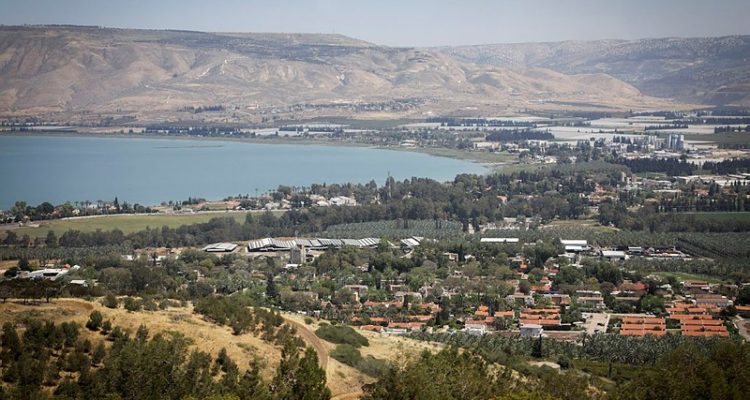As drought continues in the Galilee since 2014, the Water Authority ceases pumping water from the Kinneret.
Rachel the poetess sang paeans to the beauty of Lake Kinneret, otherwise known as the Sea of Galilee or Lake Ginosaret. But today there’s little to sing about.
Semi-arid Israel has been experiencing a drought for the last four years, and the country’s only fresh water lake is dropping precipitously. Even with pumping now stopped, it may take a miracle of several rainier than average winters to restore the lake to its normal level. A more prosaic solution will involve the pumping of desalinated sea water into the lake, in effect reversing the original function of the National Water Carrier. Today Israel is the world’s leader in desalinization, using reverse osmosis technology.
The Water Authority’s Hydrological Services announced Sunday that Lake Kinneret broke an all-time record low for the month of May. With the torrid summer season only just beginning, the level of the harp-shaped lake is likely to continue dropping to a level which affects water quality.
As of June 5, the lake stood at –213.135 meters below sea level, marginally above the lower Red Line of –213.18. With the water level dropping one centimeter daily during the summer because of the imbalance of evaporation and the flow of water from the Jordan River and local springs, the lake level is expected to drop below the Black Line of -214.4 by August.
The basin today holds less than 9 million cubic meters of water – the worst situation since 1920 when British Mandate authorities began recording the lake level.
Politics Plays a Role in the Water Crisis
Politics is also playing a role in the water crisis. An agreement signed in 2010 between Israel and Jordan committed the Jewish State to transfer an additional 50 million cubic meters to the Hashemite Kingdom on top of a similar amount already flowing from the Sea of Galilee under the 1994 peace agreement, in return for Jordan sending water to Israel from a new desalination plant to be built in Aqaba.
The low level of the lake causes increased salinity, thus reducing the water quality. Lake Kinneret’s natural salinity was once about 350 milligrams of chloride per liter, which made it difficult to use the water for irrigation. A special water channel was built in 1967 to divert the saline springs away from the lake. By 1969, the salinity had dropped to 300 milligrams per liter. Due to the four-year drought extending into 2017 which has caused the lake level to drop precipitously, the salinity has again risen to 320 milligrams per liter. Today the lake is facing severe ecological and environmental stress.
“During the month of May, more water evaporated from the Kinneret than entered into it from the [Upper] Jordan River and the springs around it,” a statement from the Water Authority said. “This caused a 15-cm. drop in the Kinneret’s level.”
Looking at multi-year averages, even accounting for the pumping that normally occurs from the basin, the Kinneret’s water level typically does not decline in May and remains stable, according to the Water Authority.
“The summer has not yet begun – and at the height of the summer, the Kinneret evaporates at a rate of 1 cm. per day,” the statement warned.
While the four-year drought has taken a heavy toll on Lake Kinneret, the dearth of rain has also severely impacted on the Dead Sea. In May, the water level of the hyper saline lake dropped by 16 cm, leaving the basin at 431.54 meters below sea level as of June 1, the Water Authority reported. The Dead Sea dropped 87 cm during the 2016-2017 hydrological season, the authority added. Today the Dead Sea’s south basin at Ein Bokek is entirely artificial, and only exists because salt saturated water is pumped from the deeper north basin via a canal to the reach the area of the hotels and the Dead Sea Potash Works.
The dwindling of the Dead Sea, caused by the diversion of Jordan River water for irrigation, has created an ecological disaster along the lake’s western shore. Due to the threat of sinkholes, beaches including the Mineral Beach Spa have been closed, and Route 90 diverted to the west at Ein Gedi to avoid unstable ground.
By Gil Zohar, World Israel News





